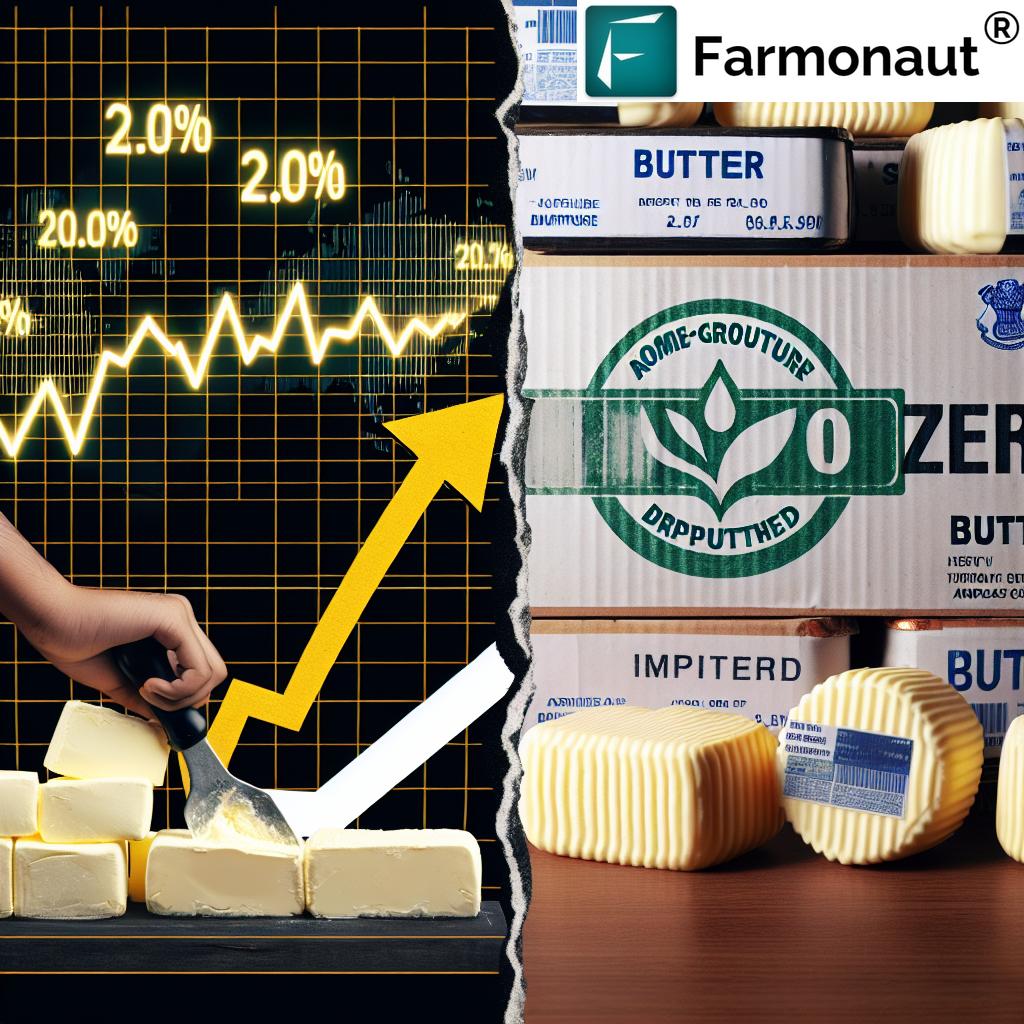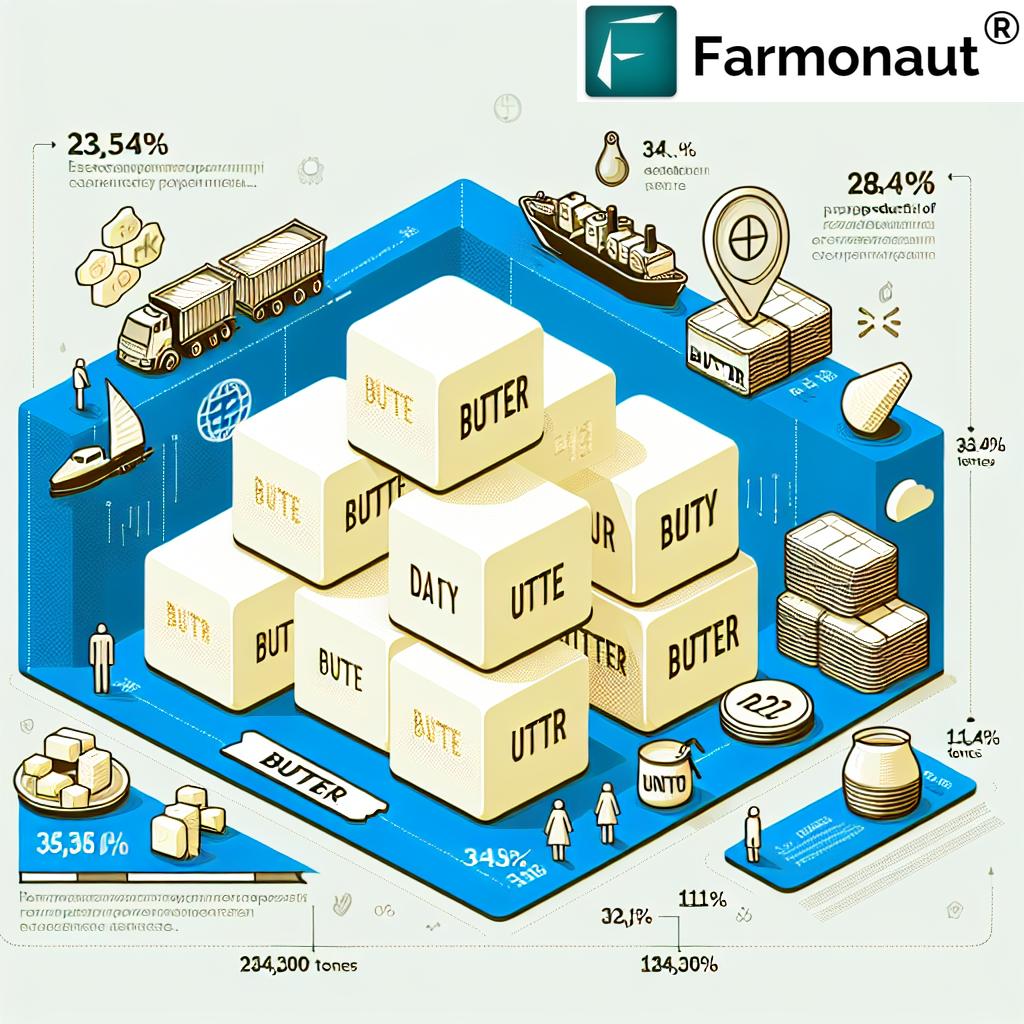Breaking: Russia’s Bold Move to Slash Butter Prices – Zero Import Duty Proposed for 6 Months

In a surprising turn of events, Russia is considering a groundbreaking measure to combat rising butter prices: setting the Russia butter import duty to zero for a six-month period. This bold move, proposed by the Agriculture Ministry Russia, aims to stabilize the Russian dairy market and provide relief to consumers facing steep price increases.
The Proposal: Zero Duty on Butter Imports
Sources close to the ongoing discussions have revealed to Interfax that the Russian government is seriously contemplating the introduction of a duty-free regime for butter imports. This measure, if implemented, would last for half a year and could significantly impact Russian butter prices.
Key points of the proposal include:
- Elimination of the current 15% basic duty on butter imports
- Removal of the minimum charge of 0.22 euros per kilogram
- Focus on imports from non-Eurasian Economic Union (EAEU) countries, particularly Iran and India
The subcommittee on customs issues has already reviewed and approved the proposal to set zero duty on butter imports. However, the final decision requires consultation with the Eurasian Economic Commission, which is expected to take place this week.
The Driving Force: Soaring Butter Prices
The primary catalyst for this drastic measure is the alarming increase in Russian butter prices. According to Rosstat, butter prices in Russia have surged by an astonishing 23.4% since the beginning of the year. September alone saw a 5.1% increase, marking the highest growth rate in the dairy sector.
Recent weeks have shown no signs of slowing down:
- October 15-21: 1.6% price increase
- Previous week: 1.4% price increase
This rapid escalation has caught the attention of Russian authorities, prompting urgent action to stabilize the market.

Government Response and Food Price Control Measures Russia
The situation has triggered a swift response from the Russian government. Deputy Prime Minister Dmitry Patrushev has taken the lead in addressing the issue, holding meetings to assign tasks aimed at Russian butter price stabilization. A follow-up meeting scheduled for October 31 will discuss broader measures to restrain prices for food products at risk of becoming more expensive.
The Russian Federal Antimonopoly Service is also actively monitoring the situation, ensuring fair competition and preventing any potential market manipulation.
Eurasian Economic Union Butter Trade Implications
The proposed zero import duty would primarily affect Eurasian Economic Union butter imports. While the EAEU typically maintains common external tariffs, this measure would create a temporary exception for butter imports from non-EAEU countries.
This move could potentially reshape Russian dairy market trends, opening up new opportunities for international trade partners, particularly Iran and India, to supply butter to the Russian market.
Russian Butter Production and Imports: Current State
Despite the price increases, Russian butter production has shown positive growth. Data from the Federal State Information System for Veterinary Medicine reveals:
- Production as of October 29: 384,300 tonnes
- Year-on-year increase: 3.5% (up from 371,300 tonnes)
Simultaneously, Russian butter production and imports have both seen an uptick:
- Butter imports: 112,300 tonnes
- Year-on-year increase in imports: 9%
These figures suggest that while domestic production is growing, it hasn’t been sufficient to meet demand and stabilize prices, necessitating the proposed import duty reduction.
Precedent: The Egg Price Crisis
The current situation with butter prices bears a striking resemblance to the egg price crisis that occurred at the end of last year. In response to a sharp rise in egg prices, the Russian government implemented a similar measure:
- Zero import duties on eggs from June 30, 2024
- Resulted in the import of up to 500 million eggs
- Measure was not extended after its expiration, as the Agriculture Ministry deemed it unnecessary
This precedent suggests that the proposed zero duty on butter imports could be an effective short-term solution to address the current price surge.
Potential Impact on Consumers and the Dairy Industry
If implemented, the Russian Agriculture Ministry butter policy of zero import duty could have far-reaching effects:
- Increased availability of affordable butter for Russian consumers
- Potential pressure on domestic producers to maintain competitive pricing
- Possible shift in market dynamics within the EAEU
- Opportunity for international suppliers to gain a foothold in the Russian market
However, the long-term implications for the Russian dairy industry remain to be seen. While the measure aims to provide immediate relief to consumers, it may pose challenges for domestic producers in the future.
Conclusion: A Balancing Act for Food Price Stabilization Russia
The proposed zero import duty on butter represents a significant step in Russian butter price stabilization efforts. By opening the market to increased international competition, the Russian government aims to provide quick relief to consumers while addressing the underlying issues in the dairy market.
As the situation develops, all eyes will be on the Eurasian Economic Commission’s decision and the subsequent impact on Russian dairy market trends. The success of this measure could set a precedent for future food price control measures Russia might implement to ensure market stability and food security.
For those interested in staying updated on agricultural trends and market dynamics, Farmonaut’s mobile app offers valuable insights and data.
Additional Resources:
Satellite API for agricultural data
As this situation continues to unfold, it’s clear that the Russian government is taking decisive action to address the butter price crisis. The coming weeks will be crucial in determining the effectiveness of this bold strategy and its impact on the Russian dairy market as a whole.

